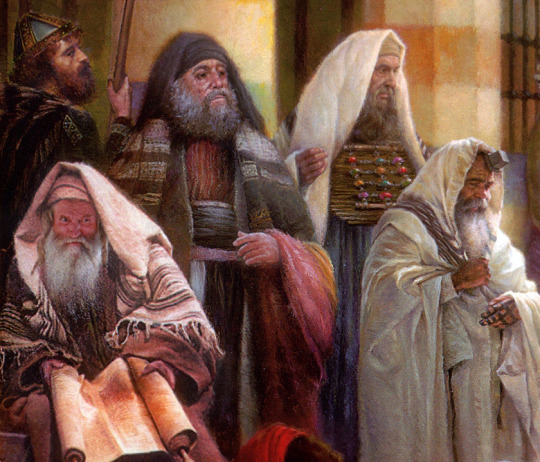#pharisees
Text

Carrying the Cross by Igor Sushenok
#jesus christ#jesus#christ#cross#crucifix#art#igor sushenok#roman#romans#pharisees#centurion#centurions#jerusalem#judaea#roman empire#christianity#christian#religion#religious art#religious#crown of thorns
604 notes
·
View notes
Text
On Calling Out Antisemitism... in the Crossword
So I like to do crosswords. It's fun, sometimes I learn random facts, it exercises my brain, and that jolt of satisfaction when I figure out the gimmick brightens my day. I usually do it on the Washington Post, which is the same as the LA Times, mainly because it's free (though these days I pay for the WP in large part because I like Alexandra Petri's pieces, but I digress.)
So there I am, working on the Sunday crossword at work on a quiet Monday morning, and the clue is "sanctimonious sort." Could be many things, I skip it and continue. Slowly, as I get some of the crosses, I say to myself, "surely this isn't going to be 'pharisee'. I'm gonna be so mad if the answer is 'pharisee.'"
The answer was Pharisee.
If you don't know why that's a problem, in brief: The Pharisees were the precursors to modern Rabbinic Judaism, and that word has been used by those enacting violence upon us for centuries-- throughout blood libels, Inquisition, crusades, expulsions, etc. When "pharisee" means "sanctimonious, hypocritical, self-righteous, etc." and "pharisee" also means "Jew" even of the historic variety, it tends to be extremely bad news for the actual living Jews of whatever era it is.
So I wrote the editors of the LA Times and the Washington Post, and I said so. I told them about the history of the term. I told them that at a time when antisemitism across the United States is rising alarmingly, it is, at best, deeply irresponsible of the newspapers to allow this insidious conflation of Judaism with moral corruption and hypocrisy to appear in what ought to be a light-hearted game.
And you know what? I got a response from the LA Times within hours apologizing for the harm and saying they'd reached out to the crossword writing company to discuss it. I got a response from the acquisitions editor, who had spoken with the crossword editor, conveying their sincere apologies, saying that they were unaware of the antisemitic implications of the term, and they would never intentionally cause harm. They thanked me for bringing it to their attention, and also thanked me for my suggestion of an alternate clue ("Contemporary of Jesus").
We on Jumblr and in the Jewish community offline have spent so much time talking our throats hoarse and our typing fingers sore about the harms of antisemitism, especially since October 7. I know many of us are feeling frustrated, burnt out, and hopeless. We start to wonder what the point is, when none of it seems to be making a dent. I almost didn't send that email. I almost let it go. I let myself be distracted by work, forgot about it for a week or so until something reminded me and I got angry all over again, and then I sent off an email that I expected to be buried in the inbox to maybe get a response in a month or so, because even if it never got read, at least I knew I had written it. But it did get read, and it got shared with the relevant people, and they cared.
Sometimes people listen. Sometimes they learn. Sometimes, all it takes is one person saying "hey, this hurt me."
I'm taking the win today.
#jumblr#antisemetism tw#antisemitism#pharisees#crossword#if you come into my mentions with anything 'well actually' about the pharisees I will block you
562 notes
·
View notes
Text
broke: the Pharisees were so EVIL, that's why Jesus TOTALLY OWNED them lolzzzz
woke: The Pharisees believed that the Messiah wouldn't come back until people's hearts were holy, so they were trying to save the Jewish people by imposing rules that they thought would lead to their deliverance
BESPOKE: The Pharisees were trying to hold onto the culture and religious identity that had held the Jewish people together for centuries, just as modern Christians can be so attached to tradition and political identities that they overlook radical love and change. Without tradition and rules, there is no order, no unity, no culture, and no sense of purpose. Yet, with too much legalism, we ignore the reason God gave us rules and customs and become thoughtless robots instead of life-long explorers of the Divine. The only way to balance these opposing ideas is through finding identity through life-changing encounters with Jesus, just like Paul, who was both a Pharisee and one of the most radical advocates for grace, mercy, and salvation through faith.
#taking a judaism class this semester has really changed my opinions on things#i think we Christians are sometimes to quick to make fun of the Pharisees instead of learning from them#christianity#pharisees#the chosen tv series#the chosen#God#Jesus#christian faith
2K notes
·
View notes
Text

Get the Pharisees name out of your mouth
#istg it is like pulling teeth to get exvangelicals to understand how fucked up this is#antisemitism#pharisees#pharisaism#judaism#jumblr
763 notes
·
View notes
Text
adventures in christian opinions about judaism
(reposted from Twitter)
So a while back I started writing a thing on the trio of parables that ends with the prodigal son (which I still need to finish) and like MAN OH MAN do Christian commentators insist that Jews hate shepherds.
Like, I can't even count the number of commentaries that insist that shepherds were "despised figures" for first-century Jews and the parables of the lost sheep and lost coin were designed to insult the Pharisees by comparing them first to a shepherd and then to a woman.
So, as is my wont whenever Christian commentators make a claim about what was normal for first-century Judaism, I decided to try to hunt down their source on this.
As I've said many times, when it comes to Christian parable interpreters' claims about what attitudes/beliefs/etc. were normal for first-century Jews, get used to the phrase "no sources are cited."
I mean, first off, as a 21st-century Jew, the insistence that 1st-century Jews hated shepherds rings odd, given that <checks notes> Abraham, Isaac, Jacob, Rachel, all of Jacob's kids (the founders of the tribes), David, etc. were all sheep-tenders. The image of God as a shepherd is pretty consistent throughout the Tanakh. That image reappears in the Qumran texts, which as far as I know, are one of the few Jewish sources we have from 1st-century Judaea.
The term "despised" gets used a lot, so I decided to dig into that one.




When I was able to find citations, I traced them back to an 1882 commentary by a guy named Frederic Farrar.
Farrar cites Heinrich Meyer as a source for this, but when I looked up THAT citation, it's Meyer saying that shepherds were a "lowly but patriarchally consecrated class" -- in other words, poor, but with a distinguished history and status.
So that's why everyone's tossing the term "despised" around--because Farrar just made it up. But what about primary sources? I went back on the hunt.
Surprisingly, in a number of reference works, like glossaries and Jeffers's "Greco-Roman World of the New Testament," I found similar assertions about the common attitude toward shepherds, for which they cited...
<drum roll>
Aristotle. You know, the Greek guy who lived 300 years before Jesus? Definitely a reliable source for Jewish attitudes of the time.
Some people cited Philo's On Agriculture. Okay, Philo was at least Jewish and lived when Jesus would have, although he was a wealthy Hellenized Jew living in Alexandria rather than a Pharisee living in the Galilee. But okay, at least it's the right culture and time period. (The reference in Philo turns out to be talking about the section of Genesis in which Joseph's brothers come visit him in Egypt. It talks about how they were proud to be shepherds, and criticizes (gentile) kings who look down on shepherds.)
Then we've got Mishnah Kiddushin, in which a bunch of rabbis are having a debate about which professions make you trustworthy vs untrustworthy, and one rabbi lists everyone from camel-drivers to herders to barbers to shopkeepers as untrustworthy. Another rabbi comes back and is like, nah, all those people are fine upstanding folks; it's doctors and butchers you've gotta watch out for. So they're citing one cranky dude with a LONG list of people he doesn't like, who immediately gets shot down, as evidence of the normative attitude for Jews about a century earlier.
Oh, and we've got a citation of Midrash Tehillim which says that God-as-shepherd doesn't have any of the failings of humans-as-shepherds, which... sure. Also, it was codified in the 1300s?
The most compelling citation is from the Talmud (Sanhedrin 25b), in which the rabbis discuss who's qualified to be a legal witness. They exclude shepherds, because shepherds graze their animals on other people's land, which some of the rabbis see as a type of theft.
The Talmud is a record of debates, but this passage definitely makes it sound like this is a majority opinion. (It should be noted that the passage disqualifies all KINDS of people, from those who lend with interest to those who fly pigeons, as having conflicts of interest.)
But the important thing here is that the Talmud includes records of debates from as late as the 4th or 5th centuries CE (300-400 years after Jesus's time), and the passage makes a point of noting that the disqualification of shepherds as witnesses is a later development.
So in other words, the idea that the Pharisees hated shepherds and would have been insulted by Jesus telling a story in which the protagonist was a shepherd is based either on Greek attitudes that are 300 years too early or Jewish ones that are 300-400 years too late.
But people will twist themselves into citation knots (or just not bother citing a source at all) to insist that this was a common attitude so they can position the Pharisees as hating those charming humble shepherds and their fuzzy little lambs.
As to WHY this idea seems to be so important to them, well, you cannot read about Luke 15 without encountering the word "outcast" roughly 90 times per page.
The framing is Jesus was friend to The Outcasts while the Pharisees despised The Outcasts and the Lost Sheep, Coin, and Sons are all parables about accepting The Outcast.
Never mind that neither the sheep, the coin, nor either of the sons got kicked out of their communities. The sheep wandered off, as sheep are wont to do, the coin was lost by its owner, and the younger son decided to leave to go on a spending spree while the older son declined to attend the welcome back party for him after his dad managed to hire a band and caterers but never thought to let his own son know what was going on and he had to find out from a hired hand.
Moreover, the term "outcasts" gets used as a synonym for "tax collectors and sinners." Tax collectors were usually pretty well-off because they ran a protection racket for the Romans. Outcasts? I mean, I guess? But hardly in the "marginalized and powerless" sense.
As far as "sinners," the NT doesn't usually bother telling us what, exactly, they did to "sin," but on the rare occasions when it does offer that context, it's almost always wealthy people.
But why talk about that when they can present the objection the Pharisees had to Jesus's dining with "tax collectors and sinners" as the Pharisees despising lowly outcasts, and insist that the Pharisees hated the idea of such people repenting and returning, and so Jesus was tweaking their noses by comparing them to shepherds and women.
As if, you know, teshuvah wasn't something the Pharisees were ALL ABOUT. If you want to actually understand, consider that the iconic tax collector in the parable of the Pharisee and the tax collector shows no inclination to STOP being a tax collector.
The objection wasn't you're having a friendly dinner with poor lowly outcasts for whom we have contempt. It was you're having a friendly dinner with people who are extorting their neighbors on behalf of the invaders who kill us for looking at them funny and have expressed no intention to stop doing that.
Now, there's a good discussion to be had about whether shunning Trump lawyers and Marjorie Taylor-Greene donors or inviting them to dinner and trying to win them over with compassion is more effective, more ethical, more compassionate (to whom?), etc.
But presumably we can see why people of intelligence and goodwill might disagree on which of those approaches is the right thing to do, and why such people might might object to the strategy they don't agree with.
But what really gets me is that Christians have the utter fucking NERVE to paint the Pharisees as inhumanly awful for not wanting to have dinner with tax collectors while viewing Corinthians as Holy Writ:

I mean, Paul's all YOU MUST SHUN ALCOHOLICS AND PEOPLE WHO ARE GREEDY and Christians are like yes, that makes sense, but if the Pharisees are like, no, I don't want to have dinner with that guy who narced on my cousin and got him crucified, Christians are like, they're monsters.
Cool, cool.
Anyway, this has been your weekly edition of Christians Need To Stop Just Making Shit Up About Jews And Then Citing Each Other Like It's Fact.
And there were a lot of "I've never heard anyone say Jews of Jesus's time hated shepherds..." responses: Maybe you haven't, but that doesn't make it uncommon.
Sources in which I've found it:
Craig Blomberg (Denver Seminary, Society of Biblical Literature, Tyndale House, NIV translation committee)
Jared Wilson (professor at multiple Baptist seminaries)
Stephen Wright (Spurgeon College (British evangelical college))
Arland Hultgren (Luther Seminary (ELCA))
Kenneth Bailey (Presbyterian/Episcopalian)
Joachim Jeremias (Lutheran, cited EVERYWHERE)
Bernard Brandon Scott (Disciples of Christ, the Jesus Seminar)
Klyne Snodgrass (Evangelical Covenant Church)
Barbara Reid (Catholic Biblical Association)
That particular trope spans denominations, decades, etc. It's not a fringe viewpoint.
#christian exegesis#antisemitism#jumblr#citational politics#bad methodology#parables#pharisees#first century judaism#second temple judaism#good shepherd#prodigal son#why are christians like this?
366 notes
·
View notes
Photo

03/17/2023
Are you allowed to bicker on the Sabbath?
JOKE-OGRAPHY:
Jesus cures a blind man on the Sabbath. Doing certain work on the Sabbath is forbidden by Jewish law, and so the Pharisees discuss this "Jesus" fellow. In the Bible, the Pharisees are split on whether Jesus is a sinner (because He did work on the Sabbath) or a true holy man (because a sinner couldn't work such signs). In this cartoon, they're instead split on whether Jews are allowed to take baths on the Sabbath, because it'd be ironic if they weren't allowed to take a bath on a day that has the word "bath" in part of its name ("sabBATH").
#jesus#clay#blind guy#when jesus spits on the poor its to heal them#bible#bible humor#catholic#catholic humor#christian#christian humor#pharisees#sabbath
257 notes
·
View notes
Text

^^^ Actually, "MAGA Mike" acts more like the Pharisees than Moses.
More seriously, you cannot be a GOP office holder these days unless you accept Donald Trump as your Lord and Savior.
#donald trump#“maga mike” johnson#hypocrite#us house of representatives#republicans#maga#the party of american weakness#worshiping false gods#pharisees#Ukraine Aid Now#johnson helps trump sabotage border security#election 2024#vote blue no matter who#mike luckovich
27 notes
·
View notes
Text

Yippee yay yippee yo
#annas jcs#annas#y2k#2007#jcs#jesus chris superstar#jesus christ superstar 1973#pharisees#artists on tumblr#oc#art#my art
10 notes
·
View notes
Text
Actually that may be too harsh to Jesus. He was a Rabbi after all, and what I've learned is that the Rabbis haaaaated the Maccabees. And can you blame them? The Maccabees and their weird incestuous jumbled up quasi theocratic mess was directly responsible for the Roman usurpation of Judea.
So it's not a surprise that a Pharisee like Jesus would view armed revolt as futile and only leading to disarray, and that the Kingdom of God was the only true state to aspire to and to wait for. But, as it was just Purim... I don't know, sitting on your hands and waiting for God to save you isn't exactly the only way to do things in Judaism now is it?
#jesus of nazareth#judaism#pharisees#zealots#the maccabees#jewish history#I don't know how to tag things lol
12 notes
·
View notes
Text





[YES. THE WAFFLE'S DYNAMITE. NICE AND CRISP. LITTLE WHILE LATER, THE PHARISEES DRAGGED A COMB THROUGH THE MEADOW. THE FRIED CHICKEN IS SWEET, CRISPY, SPICY. I MEAN, JUST ALL THE COMPONENTS OF IT.]
#s16e03 far out#guy fieri#guyfieri#diners drive-ins and dives#fried chicken#i mean#the waffle#dynamite#nice#crisp#little#pharisees#comb#meadow#spicy#components
10 notes
·
View notes
Text
You usurped Dominion over my soul,
Making you My business.
The Lord Hath Dominion over you.
My Soul is free under He,
Who made us,
Not you.
Elijah
youtube
youtube
youtube

youtube
youtube
Shaddai Elohim.

#Dominion#New Kingdom#Elijah#Trespass#Trespassers#Spirit#Authority#Truth#Eminence#Metatron#Choose the Right#Idolatry#Pharisees#Electric#Elect#Lightning#Son of Man#Hypocrites
8 notes
·
View notes
Text

The Pharisees Question Jesus
10 And straightway He entered into a boat with His disciples and came into the region of Dalmanutha.
11 And the Pharisees came forth and began to question with Him, seeking from Him a sign from Heaven, testing Him.
12 And He sighed deeply in His spirit and said, "Why doth this generation seek after a sign? Verily I say unto you, there shall no sign be given unto this generation."
13 And He left them and, entering into the boat again, departed to the other side.
The Yeast of the Pharisees and Herod
14 Now the disciples had forgotten to take bread, neither had they in the boat with them more than one loaf.
15 And He charged them, saying, "Take heed, beware of the leaven of the Pharisees, and of the leaven of Herod."
16 And they reasoned among themselves, saying, "It is because we have no bread."
17 And when Jesus knew it, He said unto them, "Why reason ye, because ye have no bread? Do ye not yet perceive, nor understand? Have ye your heart yet hardened?
18 Having eyes, see ye not? And having ears, hear ye not? And do ye not remember?
19 When I broke the five loaves among five thousand, how many baskets full of fragments took ye up?" They said unto Him, "Twelve."
20 "And when the seven among four thousand, how many baskets full of fragments took ye up?" And they said, "Seven."
21 And He said unto them, "How is it that ye do not understand?"
— Mark 8:10-21 | Third Millennium Bible (TMB)
Third Millennium Bible, New Authorized Version, Copyright 1998 by Deuel Enterprises, Inc. All rights reserved.
Cross References: Jeremiah 5:21; Ezekiel 12:2; Matthew 12:15; Matthew 12:38-39; Matthew 14:1; Matthew 14:3; Matthew 14:6; Matthew 14:20; Matthew 15:39; Matthew 16:1; Matthew 16:7; Mark 6:41; Mark 6:52; Mark 7:34; Mark 8:6; Mark 8:8-9; Acts 27:2
#Jesus#Pharisees#signs#warning#disciples#leaven#Herod#feeding the 5000#feeding the 4000#Mark 8:10-21#Gospel of Mark#New Testament#TMB#Third Millennium Bible#Deuel Enterprises Inc.
7 notes
·
View notes
Text
The saddest Gospel
In today’s Gospel, the Pharisees are trying to set Jesus up. Again.
Jesus’ response to them? It’s a question, “Is it lawful to do good on the sabbath rather than to do evil, to save a life rather than to destroy it?”
You and I don’t have to know what the Pharisees believe to know the answer. We don’t even have to know anything about God to get this one right.
The Pharisees’ actual beliefs? “All cases of saving a life supersede Shabbat, and he who hurries in these matters is praised.”
Great! Just what we would hope for. No horrible, cruel version of God. No toxic nonsense.
We’re all on the same page here – you, me, Jesus. And even the Pharisees.
Which is what makes their response to Jesus so jaw-dropping.
Instead of owning their beliefs? Instead of admitting that they have some common ground with Jesus?
They say nothing. And start plotting to kill Him.
How does that happen? Hatred. It’s all about hatred.
For the Pharisees, their hatred for Jesus is so great that they would betray their faith before they would ever admit to having anything in common with Him.
Which means that their hatred has pushed God off the throne.
Oh sure, they still use the language of their (now former) faith to talk about their new god.
But what they’re really worshipping is one of the most toxic false gods there ever was. They’re worshipping their own hatred.
It’s one of the saddest scenes in the Gospels.
And it kicks off a series of events that will end with people who truly believe they’re God’s favorites screaming at the top of their lungs for death of God’s Son.
The Pharisees may be gone, but the worship of hatred is alive and well. And not just in the obvious places.
If you’ve ever seen “Catholic” or “Christian” social media (especially clergy) spewing hateful garbage about people they disagree with.
If someone you see in Church has a habit of treating people like things, especially people who sin differently from them.
Then you’ve seen this in action.
Something has crawled onto their throne. They’ve let it get into the place in their heart that’s meant for God alone.
Whether they mean to or not, they let hatred become their god.
Something to think about the next time you and I catch ourselves lashing out – in person or online – at someone or something we don’t agree with.
Today’s Readings
#Hatred#Toxic#God#Jesus#Catholic#Christian#Church#False Gods#Worship#Heart#Lashing Out#Pharisees#Moments Before Mass
25 notes
·
View notes
Text
Godx, track 3 on Manic Pixie Dream World (long writeup sorry)
This is a key song thematically and in terms of the development of this album.
The other month I was at a urinal in a mall with a rainbow striped backpack and a younger, clean cut guy came up to me and started ranting about how he was going to send me to hell because God sends sodomites to hell and that we'd all get wiped out. So understand that what I am about to say isn't aimed at you if you're a decent Christian who leaves the judgment to God.
But I am profoundly uncomfortable with the type of "Christianity" that's spreading in North America. They act as Pharisees - ignoring and twisting the words of the Bible to justify amassing great wealth and acts of cruelty and violence against their fellow citizens. I see more and more people using their supposed faith as little more than carte blanche to live out their violent and cruel fantasies. It is uncomfortable getting approached by these people on trying to convert me knowing I may literally have to fight them off if they knew who I was.
But it is also profoundly sad to me that the positive aspects of organised religion - community, charity, solidarity - have been so closed to the LGBTQ2S community historically.
So crystallised the idea for Godx - a God who is all genders and none, a God who asks only that you dance, sing, create as veneration. I thought it was provocative and interesting but also has some deeper meaning underneath the silly dancepop exterior. It's meant to be a joyous romp but it nonetheless touches on the colonial destruction of indigenous concepts of gender the world over. This feels especially relevant lately.
The song was the first mixed and mastered by Erin Tonkon and Sarah Register, and so it's also important because they went on to do the whole record after it came out so damn good. Erin took this song and brought out the Prince influence that I'd accidentally buried in my initial mix and made it dynamic and powerful.
This is also the first track sequentially where I play every instrument, since there are no live drums.
Hope you enjoy the album and the write up 💖💖💖💖💖💖💖💖💖💖
#Godx#manic pixie dream world#Lady charles#glam rock#indie rock#Prince#David Bowie#Nonbinary#Genderfluid#Pharisees#Spotify
17 notes
·
View notes
Text
Goyim Stop Using Pharisee Like a Slur Challenge (Impossible)
12 notes
·
View notes
Text

*New Video!* - Section 3 of 5: BITTER DOCTRINE - "CHURCH LEADERS, LET MY PEOPLE GO!" -> -> https://www.youtube.com/watch?v=3RWvKkC7Ltw&list=PLE8FlkxQPQkP4Ljrix_obl1uYSx1VNyqE&index=27 <- <-
"Therefore, thus says The Lord: My anger is kindled against you, O churches of men! My discipline is prepared and made ready and shall be most severe, on account of all this blasphemy I have heard from your lips, and because of all these heresies of which you have readily accepted from all these haughty scholars, teachers, pastors, preachers, ministers and priests, who have set themselves up as an authority, who as the Pharisees of old have lifted up their heel against Me!
CHURCH LEADERS, LET MY PEOPLE GO! No more feed them, for I alone shall feed them! Let them go, so I may purge them and make them clean! LET THEM GO! Let My children come out and worship Me in a place set apart. For they are My treasure and I shall surely steal them away, even all in whom I see of Myself, those who have received of Me in sincerity and in truth, humble and penitent, with a new heart and a contrite spirit."
Excerpt from: https://www.thevolumesoftruth.com/Churches_of_Men,_Hear_The_Word_of_The_Lord
#TheVolumesofTruth#Prophecy#YAHUWAH#Jesus#TrueProphet#TheWordofTheLord#Truth#churches#Christianity#blasphemy#heresies#pastors#preachers#priests#ministers#Pharisees#LetMyPeopleGo#SetApart#ComeOut#TheMessiah#penitent
8 notes
·
View notes